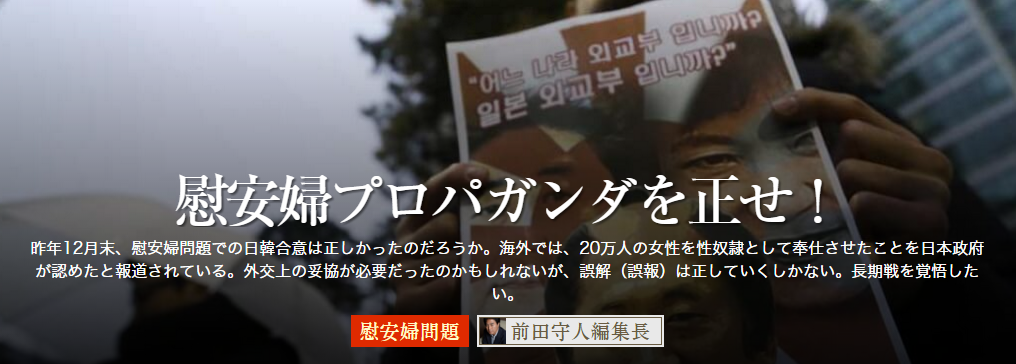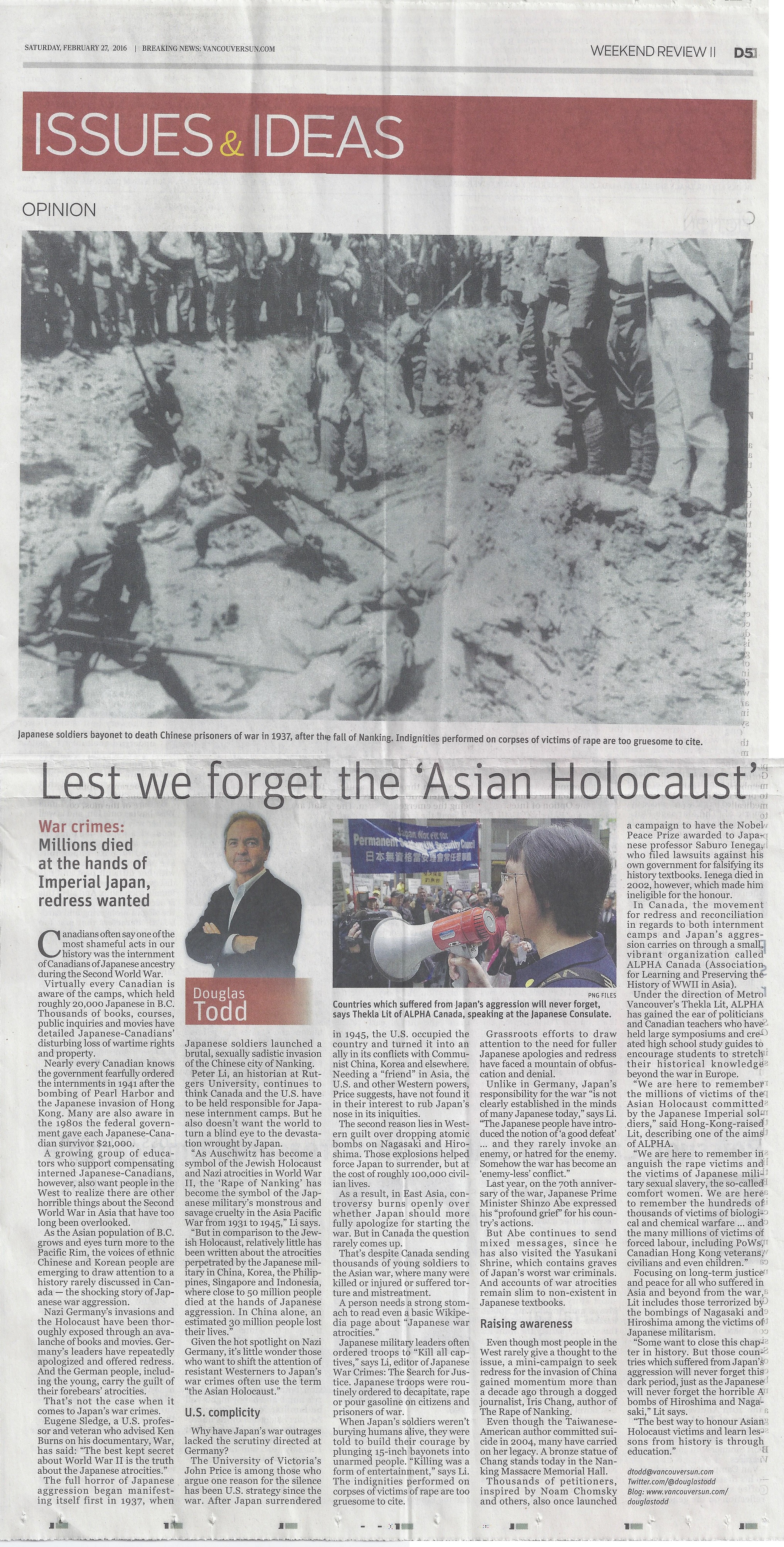************************************************************************************
Japanese version 日本語版
Follow-up Information
of
Coalition of Three Parties for Communicating Historical Truth
for
CEDAW 63rd Session Japan
regarding
Comfort Women (Paragraphs 28 & 29)
of
the Concluding Observations
************************************************************************************
Letter of Remonstration
Date: March 11, 2016
From: The Coalition of Three Parties for Communicating Historical Truth
To: The honorable members of the U.N. Committee on the Elimination of Discrimination against Women
Subject: Paragraphs 28 and 29 of the “Concluding observations on the combined seventh and eight periodic reports of Japan,” pertaining to the “Comfort Women”
We find above-mentioned paragraphs highly offensive, contemptuous, and downright rude. The contents trample on our sacred mission to clear the name of our forefathers, falsely accused of crimes they never committed.
Firstly, these paragraphs lacked any comment on the remarks by Mr. Shinsuke Sugiyama, head of the Japanese delegation, and merely enumerated the Committee’s singularly one-sided recommendations. What follows are the remarks of Mr. Sugiyama, cited from the Committee’s own “Summary record of the 1375th meeting.”
Paragraph 36:
“The full-scale fact-finding study on the issue of ‘comfort women’ conducted by the Government of Japan in the 1990s had not found confirmation of the widespread belief that such women had been forcibly removed from their country by Japanese military personnel or Government agents. The testimony to that effect contained in the 1983 memories of Japanese novelist Seiji Yoshida had been disputed and subsequently disproved by Japanese scholars. Moreover, in 2014, a leading Japanese newspaper had issued a corrigendum to several articles which had relied heavily on Yoshida’s fabricated testimony and had issued an apology to its readers. There was no evidence to support the claim made by a leading Japanese newspaper that as many as 200,000 women had been recruited as comfort women during the Second World War, and that had subsequently been recognized by the newspaper itself. The figure could well be the result of a conflation of the number of women recruited as comfort women and the number recruited by the Women’s Volunteer Labour Corps. The Government of Japan also rejected the unfounded claim that the comfort women had been akin to sex slaves.”
After Mr. Sugiyama made this statement, a committee member stood up and hysterically shouted, “History is history!” Perhaps the truth is unimportant to some of your esteemed colleagues so as long as they are able to freely brand the entire Japanese people as “Rapists and Murderers” with hot red iron.
To support this observation, the aforementioned paragraphs do not contain any mention of our refutation to the 1996 Coomaraswamy Report. We will not reiterate our claims in detail here but, in brief, in addition to the full-scale investigation made by the Japanese Government, the U.S. Nazi War Crimes & Japanese Imperial Government Records Interagency Working Group Report produced nothing to substantiate the claim of the criminal nature of the “comfort women”. In addition, the government of the Republic of Korea has not presented any evidence of forced recruitment. Professor An Byong-jik of SeoulUniversity has pointed out the highly dubious nature of the testimonies of former “comfort women.”
An effort to confuse the issue is the intentional mix-up of “Conscripted labor” and Comfort Station prostitution, as clearly manifested in the name “Korean Council for Women Drafted for Sexual Slavery by Japan,” or “Korean Council,” a fanatical Korean activist group with a zeal for disparaging Japan. Conscripted labor was merely assignment to industrial work within either Japan or Korea—and not prostitution. No law or regulation either permitted or mandated overseas prostitution. Therefore, the name of this particular Korean activist group is fraudulent, designed to sow falsehood.
One of the former comfort women Professor C. Sarah Soh interviewed at a “House of Sharing” told her that “80 percent of South Korean comfort women survivors had been prostitutes…” However, the Korean Council declined to include her testimonial in its multivolume series of collections of survivors’ testimonials. (p.97, The Comfort Women by C. Sarah Soh, Chicago Press)
Given these facts, how can you be so sure that former comfort women are not making false allegation without examining whether they are telling the truth or not?
The combined evidence, including newspaper articles published during the Korea-Japan Annexation era and “Report No. 49: Japanese Prisoners of War Interrogation on Prostitution” prepared by Unites States Office of War Information, entitle Japan and the Japanese people to a presumption of innocence until proven otherwise.
Nonetheless, the current Committee claims that “some comfort women have died without obtaining an official unequivocal responsibility by the State party for the serious human rights violations that they suffered” and urged “the State party to provide full and effective redress and reparation, including compensation, satisfaction, official apologies and rehabilitative services.”
Does this not constitute a modern-day lynching?
Has the United Nations ever “provided full and effective redress and reparation, including compensation, satisfaction, official apologies and rehabilitative services” to Korean comfort women (Yungcon-ju) forcibly mobilized to provide sexual services for U.N. military personnel, as Class V Supplies, during the 1950-53 Korean War?
Inaction by the UN, a champion of human rights, on flagrant violations of human rights is the apex of hypocrisy. Perhaps the real name of the current Committee is the “Committee to Promote Discrimination against the Japanese Race.”
In addition, we cannot overlook the comment in Paragraph 28 on Japan’s recent bilateral agreement with the Republic of Korea, that it “did not take a victim-centered approach.”
What, in fact, are the demands of the former “comfort women” living in the House of Sharing? They demand that “Prime Minister Abe or current Emperor Akihito come to the House of Sharing to kneel down and beg for their mercy.”
Who created these monsters with over-inflated egos? The responsibility squarely rests with your colleagues, those who disregard historical facts and ignore the rights of women and children suffering today in war-torn countries, who spend all of their time writing pure nonsense merely for the sheer joy of chastising the good people of Japan.
We consider that the current Committee’s recommendations are disrespectful to the nation and people of Japan and we Japanese have absolutely no intention on succumbing to the bizarre and uncouth demands of so called former “comfort women”.
Regards,
-End of the Letter-


